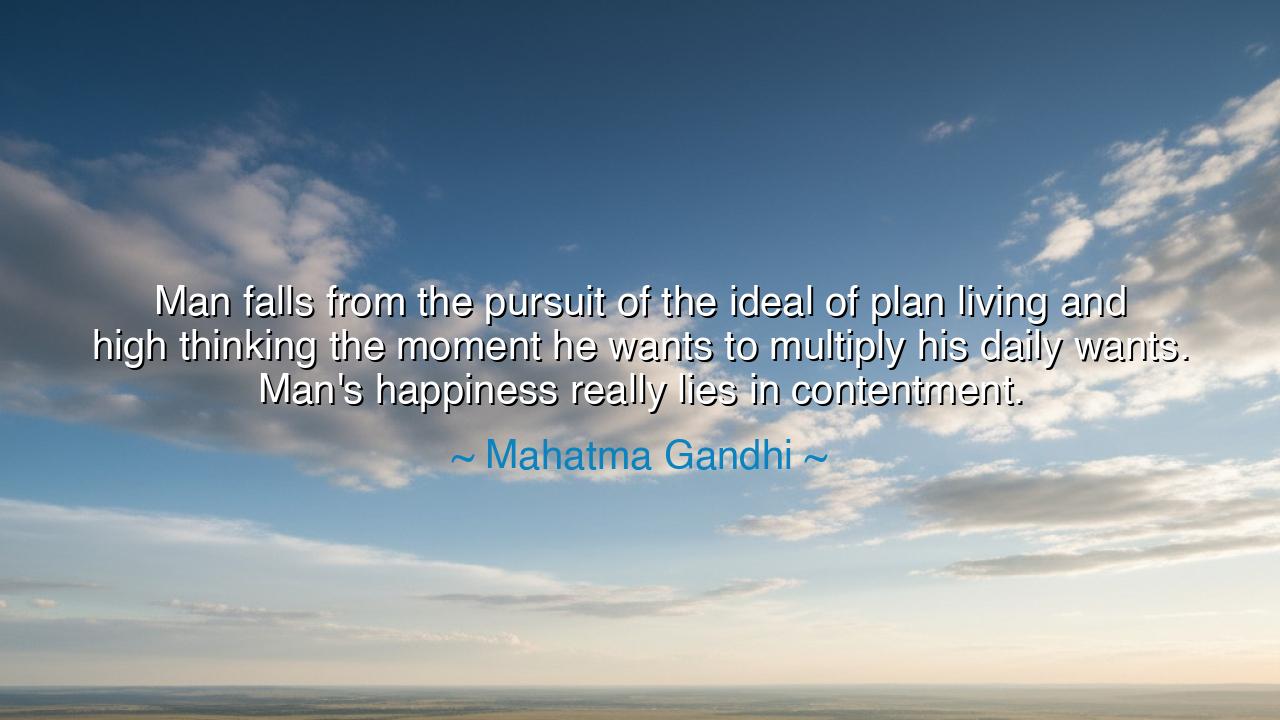
Man falls from the pursuit of the ideal of plan living and high
Man falls from the pursuit of the ideal of plan living and high thinking the moment he wants to multiply his daily wants. Man's happiness really lies in contentment.






The great soul Mahatma Gandhi, who walked upon the earth clothed in simplicity but crowned in truth, once said: “Man falls from the pursuit of the ideal of plain living and high thinking the moment he wants to multiply his daily wants. Man’s happiness really lies in contentment.” In these words lies a warning, a philosophy, and a prayer for the human spirit. For Gandhi saw that the chains that bind mankind are not only forged of iron, but of desire—that restless hunger for more, which turns the pure heart of man away from peace and toward endless striving.
To understand his wisdom, one must first understand the age in which he spoke. The world was changing swiftly; empires were rising on the strength of machines, and men began to believe that abundance was the same as happiness. Yet Gandhi, standing amidst the noise of industry and the fever of ambition, looked upon the poor villager spinning his thread, and saw in him a serenity that the powerful could not buy. Thus was born his creed of plain living and high thinking—a call to return to the essence of life, where simplicity nourishes the soul and thought rises toward the divine.
When Gandhi says that man “falls” the moment he begins to multiply his wants, he speaks of a spiritual descent. For every desire that grows beyond necessity becomes a shackle. The man who once owned his possessions becomes possessed by them. His mind, once clear as a river, grows muddied by craving. He begins to measure his worth by what he has rather than what he is. In that moment, he ceases to pursue the ideal and begins to chase illusion. Gandhi’s insight was that the pursuit of endless wants is not progress—it is a subtle form of enslavement.
History offers many witnesses to this truth. Consider the Emperor Ashoka, who conquered vast lands through blood and power. Surrounded by wealth and glory, he was yet tormented by emptiness until he turned his heart toward peace and compassion. In renouncing conquest, he found contentment. His greatness did not lie in his empire, but in his realization that simplicity of heart brings the only true joy. So too did Gandhi live—owning little, desiring less, yet possessing a wealth of spirit that even kings envied.
Contentment, to Gandhi, was not stagnation; it was the stillness of the enlightened. It is not to abandon dreams, but to pursue them without greed. It is to eat when hungry, to rest when weary, to think clearly, and to love deeply. The man who is content lives in freedom, for nothing owns him. His happiness does not depend on the world’s applause, nor does his peace falter when fortune fades. This is the power of simplicity—that the fewer one’s wants, the greater one’s liberty.
In contrast, the world today teems with endless craving. The markets promise satisfaction, but deliver restlessness. The screens glitter, but behind their glow, hearts grow hollow. Gandhi foresaw this: that modern man, in multiplying his comforts, would lose comfort itself. For the mind cannot drink from a thousand cups and still be quenched. Only when one cup—the cup of contentment—is held close, does the soul taste peace.
Therefore, the teaching of the Mahatma is both humble and heroic: reduce your wants, elevate your thoughts. Let your joy come not from acquisition, but from appreciation. Let gratitude be your daily prayer and simplicity your chosen path. Seek richness not in gold, but in goodness; not in luxury, but in love. In every act of restraint, you draw closer to freedom; in every moment of gratitude, you grow nearer to the divine.
And so, my listener, remember this eternal lesson: the happiness of man lies not in the abundance of things, but in the abundance of peace within. The one who can be content with little has mastered life itself. For as Gandhi taught by word and by example—when we choose plain living and high thinking, we rise above the world’s noise and walk quietly toward the light of truth, where true joy awaits, unshaken and everlasting.






AAdministratorAdministrator
Welcome, honored guests. Please leave a comment, we will respond soon